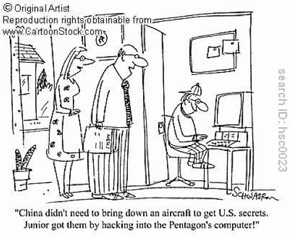
China's Role in Cybernetic Warfare: Past, Present, and FutureGina Mawla Imagine for a moment that the year is 2090. You are surfing the Internet, clicking rapidly through different websites, exploring multiple web pages at a time, stopping only briefly to read the news about the current war with China. Suddenly, your computer screen goes blank. Panicking, you manage to click your way back to the Internet only to be shot back to a blank screen once again. Around the nation, all US websites disappear from the web. Almost all of the military’s war commands around the globe lose connection. The entire US submarine fleet’s link to the Internet is lost. America is at war. Not just any war- a cybernetic war. The great dependence on computers in this new technological era makes an information war inevitable- an attack on a nation’s information systems and internet connections is cheap, anonymous, and effective- and done completely without a casualty count. Categories of cyber war include web vandalism, disinformation operations, the obtaining of secret records, and attacking essential infrastructure. Dr. Ivan Goldberg describes information war as: “The offensive and defensive use of information and information systems to deny, exploit, corrupt, or destroy, an adversary's information, information-based processes, information systems, and computer-based networks while protecting one's own. Such actions are designed to achieve advantages over military, political or business adversaries.” (Goldberg, 2007). Many nations today have not only employed minor cybernetic warfare tactics, but are passionately planning and gathering information to launch this type of war in the near future. One country that is already deeply rooted in this militaristic strategy is China. Journalist for military.com, Peter Brookes states, “According to the U.S.Pentagon, China’s military planners recognize that…computers for command, control, communications and intelligence is a potential strategic weakness, ripe for exploitation.” (Brookes, 2005). China has modernized its militaristic plans (from fighting with artillery to hacking into data bases) in order to adapt to this computerized era. In this article we will focus on China’s role in cyber war in the past, present, and future. PAST: CHINA’S INVOLVEMENT WITH THE PENTAGON
 The juxtaposition of a Chinese hacker and a Pentagon official gives the viewer a sense of cybernetic-warfare. In June of 2007, the U.S. Pentagon’s computer network was hacked into by the Chinese military. CNN reported, “About one-third of computer users in the Pentagon that work for Defense Secretary Robert Gates had their email systems penetrated.” In response to the People’s Liberation Army of China’s attempt to steal secret data from the US Defense Department, about one-third of the people who work for Gates (about 1,500 people had their email service shut down. Directly after the hacking, the Pentagon investigated and cleaned 1,500 computers, a process that takes several weeks.
This drawing illustrates the media’s ability to nervously laugh off the Pentagon cyber-attacks. The cartoon pokes fun at the “easily accessible” hidden information from the Pentagon, and jokes that almost anyone, even Junior in this case, can hack into the intricate Internet systems of the Pentagon. China dismissed all hacking accusations, blaming the allegation on “Cold War” mentality. A former US official stated that there was a “very high level of confidence…trending towards certainty” (Knight, 2007) that China was responsible for the cyber attacks. According to a news report in the Financial Times, computer hackers from multiple locations in China spent several months monitoring and lurking the Pentagon system before the actual action took place. This action taken by the Chinese military is considered to be the “most successful cyber attack ever on the US defense department,” according to US officials. As a result, officials are now rethinking the type of data they transfer over unsecured e-mail networks. PRESENT: CHINA'S "ARMY OF HACKERS"Today, the People’s Liberation Army of China takes the art of information warfare extremely seriously. According to Peter Brookes from military.com, China places the progression of cyber-warfare a “top-national security priority” (Brookes, 2005). The development of info-warfare is such a main concern to China that it has caused China’s military to “incorporate cyber-warfare tactics into military exercises and create schools that specialize in information war” (Brookes, 2005). China is, at this moment, training young students to become expert hackers who will, one day, have the abilities to launch a cyber-attack on any governments’ computer networks in the world. This is a huge threat to nations who have grown to become dependant on computers and the Internet. Brookes explains that China is “also hiring top computer-science graduates to develop its cyber-warfare capabilities and, literally, create an ‘army of hackers.’” (Brookes, 2005).
Pictured above is a Chinese military official teaching a young student of war the ins and outs of the Internet and it’s capabilities for information war. On top of having a defense military, China is building up its army of info-war strategists. This large nation has come to the conclusion that having a swarm of hacking experts will conduct more anonymous damage than troops of armed combatants ever can. The U.S.-China Security Review Commission (USCC) states, “The Chinese realize that they cannot win a traditional war against the U.S. (in Asia) and are seeing unorthodox ways to defeat the U.S. in any such conflict…while building up their military power to eventually match or exceed U.S. military capabilities in East Asia” (Brookes, 2005). China’s militaristic strategy of finding “soft spots” within other nations’ defense departments is an exceptional way for a government to view war. China realizes that it may not have the most up-to-date weaponry or the best-trained army, but China is aware that in the fields of math and computer engineering, it is ranked one of the highest nations in the world (China is ranked Level 5 according to the International Mathematical Union). By using its strong points to overcome another nations weak points through cyber warfare is one of China’s militaristic strategies of today. FUTURE: CHINA’S PLANS ON CYBER-WARFAREIn the past, China has hacked into the Pentagon’s secret files. Today, China is training its youth to be info-war experts. What is China planning for its future? According to a USCC report, the Chinese plan to target “all American vulnerabilities, including civilian communications systems or the vital nervous systems of our economic institutions such as the New York Stock Exchange’s computer system” (Gupta, 2006). In the future, China will possibly extend its hacking capabilities to affect not only governments of nations, but the economy and lives of everyday civilians as well. By gaining control over the New York Stock Exchange’s computer system, the Chinese could possibly manipulate the U.S. economy. However, it is safe to say that China isn’t necessarily America’s next foe, but its info-war advancements are definitely something to keep an eye on. In the future, it is likely that warfare over the Internet will be as essential as warfare practiced in the sea, sky, and land. One of China’s main militaristic goals today is to “achieve electronic supremacy by 2050” (Swabey 2007). Stick around for the about the next forty years to see if this comes true! Works CitedBrookes, Peter. “The Art of (Cyber) War.” Military Opinions. 29 August 2007.http://www.military.com/Opinions/0,,Brookes_082905,00.htmlEdwards, David. “Pentagon Confirms Email System Hacked.” The Raw Story. 21 June 2007. http://rawstory.com/news/2007/Pentagon_confirms_email_system_hacked_0621.html Goldberg, Ivan. “IASIW.” Institute For the Advanced Study of Information Warfare. 22 September 2007. www.psycom.net/iwar.1.htmlGupta, Arup Kr. “Cyber Crime in India and its Laws.” 3 May 2006.http://209.85.173.132/search?q=cache:ZxdXCZgD7VIJ:www.indiancyberlaws.blogspot.com/+all+American+vulnerabilities, Image Sources:1. Web Media Brands. 18 September. http://www.mediabistro.com/fishbowlny/new_media/cyber_war_wsjcom_versus_nytimescom_67291.asp |













